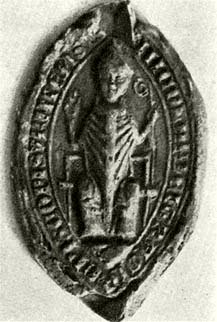Related Research Articles
Ponsa or Pousa was a Hungarian-born Dominican friar who served as Bishop of Bosnia from 1238 to 1270. He was appointed by Pope Gregory IX in an effort to combat the autonomous Bosnian Church, but found no support in Bosnia. He fled the country in the 1240s, never to return.
Fancica or Francica was a Hungarian prelate at the turn of the 11th and 12th centuries, who served as Bishop of Zagreb from around 1125 to 1131, then Archbishop of Kalocsa from 1131 until his death.
Simon was a prelate of foreign origin in the Kingdom of Hungary in the first half of the 12th century. He was bishop of Pécs from around 1108 until 1135 at the latest, and archbishop of Kalocsa and Bács between around 1135 and 1142. His command of Greek is well attested in the sources.

Julius (I) from the kindred Rátót was a powerful Hungarian baron and landowner, who held several secular positions during the reign of kings Andrew II and Béla IV. He was the founder of the gens Rátót's economical and political power.
Mojs, also Moys or Majos was a Hungarian noble, who served as Palatine of Hungary between 1228 and 1231, during the reign of Andrew II.
Marcellus was a Hungarian prelate at the turn of the 11th and 12th centuries, who served as Bishop of Vác from around 1111 to 1113, then Archbishop of Esztergom from around 1116 until his death.
Felician was a Hungarian prelate in the first half of the 12th century, who served as Archbishop of Esztergom from around 1125 until his presumably death in 1139 or later.
Crispin or Krispin was a prelate in the Kingdom of Hungary in the late 12th century, who served as Bishop of Csanád from 1192 until around 1193/98.
Ded was a prelate in the Kingdom of Hungary in the 12th century, who served as Bishop of Vác during the reign of Géza II of Hungary.
Chama, also Sayna or Chemma, was a Hungarian prelate in the twelfth century. He was successively Bishop of Eger from 1158 to around 1166, then Archbishop of Kalocsa between around 1169 and 1171.
Oliver was a Hungarian prelate in the 13th century, who served as Bishop of Syrmia from 1250 to 1262. He resigned due to poor health and joined the Franciscans.
Lawrence from the kindred Becsegergely was a Hungarian clergyman of noble origin in the 13th century.
John was a Hungarian prelate in the 13th century, who served as Bishop of Syrmia from 1262 to 1269, at least.
Pouka was a Hungarian prelate in the 13th century, who served as Bishop of Syrmia from around 1277 until 1293.

Nicholas was a Hungarian prelate in the 13th century, who served as Bishop of Syrmia from around 1299 to 1300.
Vincent was a Hungarian prelate at the turn of the 13th and 14th centuries, who served as Bishop of Syrmia till 1306, then Archbishop of Kalocsa from 1306 until his death. He supported the claim of Charles I of Hungary in his struggle for the Hungarian throne.
Cletus from the kindred Bél was a Hungarian prelate in the first half of the 13th century, who served as Bishop of Eger from 1224 to 1245. As royal chancellor, he drafted the Golden Bull of 1222 issued by King Andrew II of Hungary.
Bulcsú from the kindred Lád was a Hungarian Catholic prelate in the 13th century, who served as Bishop of Csanád between 1229 and 1254. Prior to that he functioned as Provost of Győr from 1221 to 1229. He was chancellor in the royal court of King Andrew II of Hungary between 1228 and 1229.
Peter (I) from the kindred Tétény was a Hungarian noble in the first half of the 13th century, who administered counties during the reign of Andrew II of Hungary.
Everard was a Hungarian Catholic prelate in the 12th century, who served as Bishop of Nyitra at least from 1183 to 1198.
References
- ↑ Ternovácz 2011, p. 34.
- ↑ Ternovácz 2011, p. 35.
- ↑ Ternovácz 2011, p. 36.
- ↑ Zsoldos 2011, p. 95.